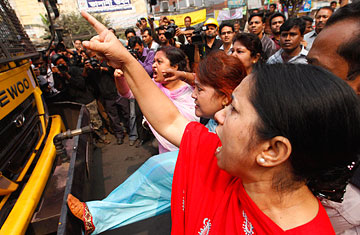
Bangladesh Nationalist Party supporters shout at a police van during an antigovernment strike in Dhaka on Feb. 7, 2011
For once, the infamously choked streets of Dhaka were wide open, but no one was particularly relieved. On Monday morning, bicycle rickshaws, motorbikes and the occasional bus had the run of the road in the frenetic capital of Bangladesh as the opposition party called another hartal, or strike. The hartal has long been an instrument of dissent in Bangladeshi politics, but in a nation trying to get ahead, many feel the tradition slows down more than traffic.
From dawn to dusk, protesters gathered across the capital to demonstrate — both in favor of the strike and against it. In front of the opposition headquarters of the Bangladesh Nationalist Party (BNP), several dozen police officers wearing helmets and carrying shields faced off with BNP supporters who had gathered there. Demonstrators shouting "Hartal! Hartal!" had been called to the streets by BNP chairperson Khaleda Zia to protest allegations against BNP supporters in relation to a January protest, in which one police officer was killed, as well as problems in the stock market, spiraling food and gas prices and power shortages.
In a few chaotic moments, police chased demonstrators on the street in front of the opposition party's headquarters, but the scuffles appeared to die down quickly. By noon, however, BNP leaders were already claiming hundreds of supporters had been injured throughout the country. Habib-un-Nabi Sohel, BNP secretary of volunteer affairs, pointed to the armed police. "This is a government operation you are seeing," he said, shaken. "We can't protest. We can't speak for the people. Police are arresting us, beating us ... These things are happening frequently in this country right now."
Though hartals often turned violent in the past, Monday's strike was relatively peaceful, with no reported casualties or attacks on civilians. Still, local media reported that over 80 people were injured, and that on Tuesday police had accused over 1,600 BNP leaders and activists for activities during the strike, including allegedly setting fire to several buses in Dhaka on the eve of the protests.
The government of Prime Minister Sheikh Hasina had tried to get the protest called off by denying it had accused Zia of any wrongdoing in the January protest and by appealing to a cause all Bangladeshis could get behind: cricket. The country is preparing to host the 2011 Cricket World Cup next week, an event that is expected to draw much-needed tourist revenue and generate some good publicity for the country.
But the government's appeals were not enough. The strike went ahead, forcing hotels to slip urgent warnings under guests' doors advising them to stay inside. In a Cabinet meeting the following day, Hasina condemned the hartal, claiming the opposition had manufactured the very issues it was protesting. "BNP has created issues for calling [the] hartal by manipulating the share prices and hoarding essential commodities," the Prime Minister told her Cabinet, according to local English newspaper the Daily Star.
For the 156 million people in Bangladesh well outside this political fray, food prices are becoming a serious problem. Prices have been creeping up for the past several months, and in December, inflation of rural food prices rose nearly 12%. Mobile rice markets selling subsidized grain have been deployed throughout the capital, and in Dhaka's largest rice market, where bags of Bangladeshi rice are stacked from floor to ceiling, one rice trader says he has never seen prices as high as they are today. He too thinks big rice buyers are hoarding stocks to drive up prices, but predicts that either way, consumers will have to pay. "People have to eat rice," he said.
Near Dhaka University, a group of young men sat on the car-free road, listening to leaders of the ruling party rail against the strike and chanting the name of Prime Minister Hasina. "The people of Bangladesh have rejected this hartal," said Mahfuzul Haider Chowdhury Roton, the general secretary of the Bangladesh Chhatra League, a student political party. "You can see, people aren't supporting it," he said, referring to the empty streets. "It gets in the way of our economy and our daily lives."
That interruption cuts very deep for some. Tariqual Islam, a 24-year-old rickshaw driver, waited for a fare outside the headquarters of Hasina's Bangladesh Awami League after an anti-hartal demonstration broke up. Normally, he said, he takes home about $18 a day. By midday on Monday, he made less than $2. "It's not a matter of supporting or opposing the politics of the hartal," Islam said. "I don't like it. I think it should stop."
